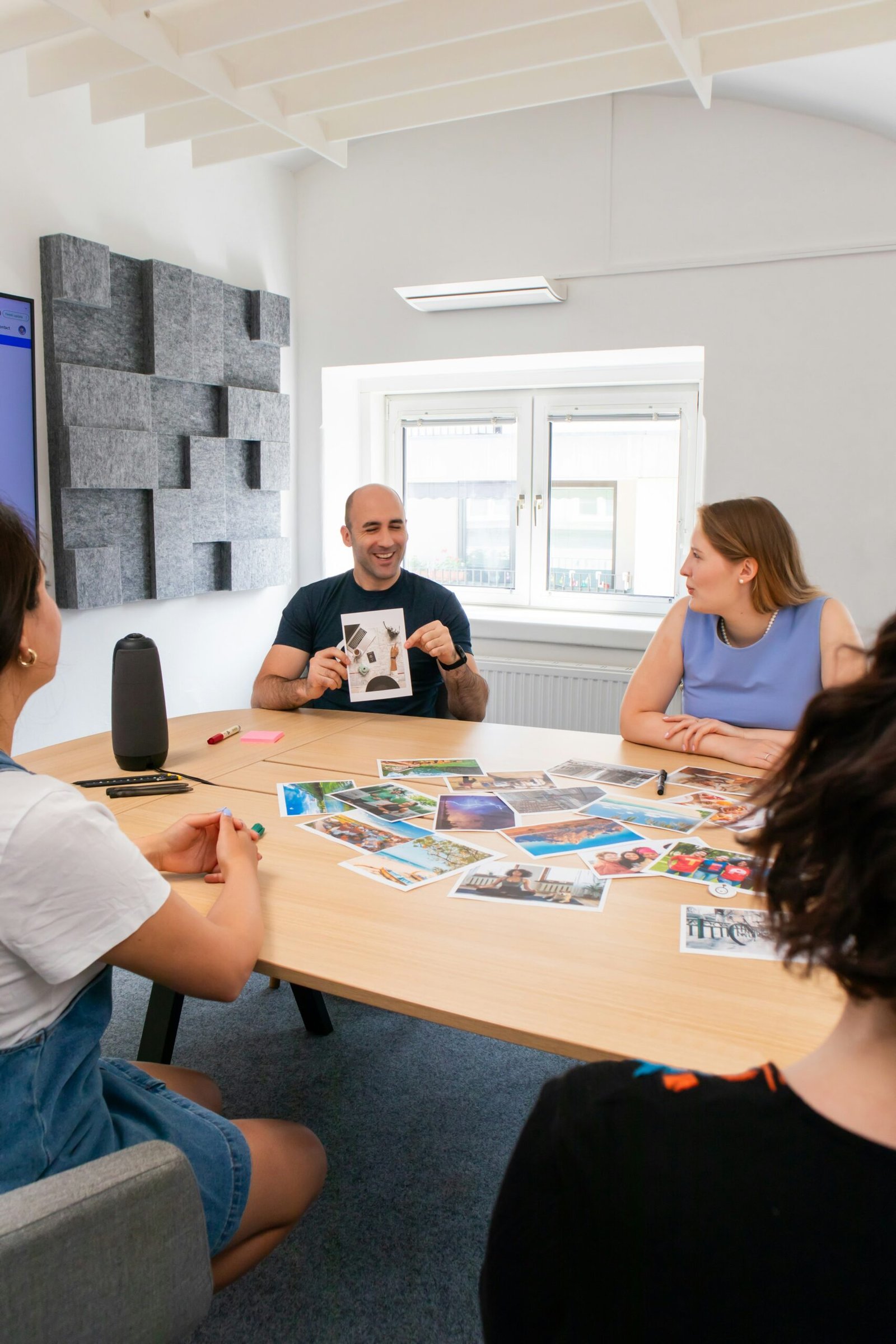Introduction to Self-Reflection
Self-reflection is a deliberate process of introspection where individuals examine their thoughts, emotions, and behaviors to gain a deeper understanding of themselves. This practice involves taking a step back to evaluate one’s experiences and actions, thereby facilitating personal and professional growth. In the realm of career development, self-reflection plays a pivotal role in helping individuals identify their strengths, weaknesses, values, and goals.
Understanding what drives you and recognizing areas for improvement can significantly impact your career trajectory. By engaging in self-reflection, professionals can make more informed decisions about their career paths, ensuring alignment with their personal values and long-term objectives. This introspective process can lead to enhanced job satisfaction, increased productivity, and a clearer sense of purpose.
Self-reflection is not merely about identifying flaws or shortcomings; it is also an opportunity to celebrate achievements and acknowledge progress. This balanced approach provides a comprehensive view of one’s capabilities and fosters a growth mindset. As individuals become more self-aware, they are better equipped to navigate the complexities of their careers, adapt to changes, and seize new opportunities.
In the context of career development, self-reflection serves as a foundation for setting realistic goals and creating actionable plans. It encourages continuous learning and adaptation, which are essential in today’s dynamic job market. By regularly assessing their career aspirations and progress, professionals can stay aligned with their evolving interests and the demands of their industry.
This blog post will delve deeper into the various aspects of self-reflection and its significance in career development. Subsequent sections will explore practical techniques for effective self-reflection, its impact on career planning, and real-life examples of individuals who have successfully utilized self-reflection to advance their careers. Understanding and implementing self-reflection can be a transformative experience, paving the way for a fulfilling and successful professional journey.
Understanding Self-Reflection: Definitions and Theories
Self-reflection is a critical process in personal and professional development, involving a conscious examination of one’s thoughts, feelings, and behaviors. At its core, self-reflection is the ability to engage in introspection, allowing individuals to assess their experiences, motivations, and actions. This process helps identify strengths and areas for improvement, guiding personal growth and career progression.
From a psychological perspective, self-reflection is deeply embedded in cognitive and behavioral theories. Albert Bandura’s social cognitive theory, for instance, emphasizes the role of self-reflection in self-regulation and learning. According to Bandura, individuals can critically evaluate their behavior and its outcomes, which in turn influences future actions. This reflective practice is essential for developing self-efficacy and achieving personal goals.
Philosophical approaches also offer valuable insights into self-reflection. Socratic philosophy, with its emphasis on the examined life, advocates for continuous self-inquiry to achieve wisdom and virtue. Modern existentialist thinkers like Jean-Paul Sartre and Søren Kierkegaard further delve into the importance of self-awareness and authenticity. They argue that self-reflection is essential for understanding one’s existence and making meaningful life choices.
Additionally, Donald Schön’s concept of the “reflective practitioner” highlights the importance of reflection in professional practice. Schön distinguishes between reflection-in-action and reflection-on-action. Reflection-in-action occurs during the activity, allowing for immediate adjustments, while reflection-on-action happens after the event, providing deeper insights into one’s practice. This dual approach ensures continuous learning and improvement in one’s career.
Research by scholars such as John Dewey and David Kolb also underscores the significance of reflective thinking in experiential learning. Dewey’s model of reflective thought stresses the iterative process of observation, analysis, and action, while Kolb’s experiential learning cycle emphasizes the role of reflective observation in transforming experiences into knowledge.
By understanding these theoretical frameworks, individuals can better grasp the fundamental role of self-reflection in career development. This foundational knowledge sets the stage for exploring practical self-reflection techniques and their impact on professional growth.
The Benefits of Self-Reflection in Career Development
Engaging in self-reflection is a critical component of career development, offering numerous benefits that can significantly enhance one’s professional journey. One of the primary advantages of self-reflection is the improvement of self-awareness. By taking the time to analyze one’s strengths, weaknesses, values, and motivations, individuals can gain a clearer understanding of their professional identity. This heightened self-awareness enables professionals to make more informed career decisions that align with their personal and professional goals.
Furthermore, self-reflection fosters better decision-making. When individuals reflect on past experiences and outcomes, they can identify patterns and learn from previous successes and failures. This introspective process allows for more thoughtful and strategic choices, reducing the likelihood of repeating past mistakes. Enhanced problem-solving skills also stem from self-reflection. By regularly examining one’s thought processes and behaviors in challenging situations, professionals can develop innovative solutions and adapt more effectively to changing scenarios.
Another significant benefit of self-reflection in career development is more effective goal-setting. Reflecting on past achievements and areas for improvement enables individuals to set realistic, attainable, and meaningful goals. This goal-setting process is grounded in a deep understanding of one’s capabilities and aspirations, leading to greater motivation and commitment to achieving these objectives.
Real-life examples further illustrate these benefits. For instance, Sarah, a marketing manager, regularly engaged in self-reflection and discovered her passion for digital marketing. This insight prompted her to pursue additional training and certifications, ultimately leading to a promotion and increased job satisfaction. Similarly, John, a software engineer, used self-reflection to identify his struggle with time management. By acknowledging this weakness, he implemented new strategies that significantly improved his productivity and performance.
Incorporating self-reflection into one’s career development process can lead to improved self-awareness, better decision-making, enhanced problem-solving skills, and more effective goal-setting. These benefits collectively contribute to a more fulfilling and successful professional life. By taking the time to reflect, professionals can navigate their career paths with greater clarity and purpose.
Techniques and Tools for Effective Self-Reflection
Engaging in self-reflection is a pivotal component of career development. It allows individuals to gain insights into their strengths, weaknesses, and areas for growth. To facilitate effective self-reflection, there are several techniques and tools that one can utilize. One of the most accessible methods is journaling. By writing down thoughts and experiences regularly, individuals can identify patterns and gain a deeper understanding of their professional journey. Journaling provides a space to articulate goals, reflect on achievements, and contemplate challenges, making it an invaluable tool for continuous personal development.
Meditation is another effective technique for self-reflection. Through mindfulness practices, individuals can clear their minds and focus on the present moment. This mental clarity can lead to profound insights about one’s career path and personal aspirations. Meditation encourages introspection, helping individuals to understand their motivations and align their actions with their professional goals.
Feedback from peers and mentors is also crucial in the self-reflection process. Constructive criticism and external perspectives can reveal blind spots and provide a more comprehensive view of one’s abilities and performance. Engaging in regular feedback sessions can foster a culture of continuous improvement and mutual growth, enhancing both individual and team performance.
Self-assessment exercises are practical tools for structured reflection. These exercises often include personality tests, skills assessments, and career interest inventories, which can provide valuable data about one’s professional inclinations and competencies. Utilizing these tools can help individuals make informed decisions about their career paths and identify areas that require further development.
Creating a regular self-reflection practice is essential for maintaining consistent progress. Setting aside dedicated time each week for reflection can help integrate this practice into one’s daily routine. Whether it’s through journaling, meditation, seeking feedback, or conducting self-assessments, the key is to approach self-reflection with intention and openness. By doing so, individuals can continuously evolve and adapt, ensuring sustained career growth and fulfillment.
Overcoming Challenges in Self-Reflection
Self-reflection is an indispensable part of career development, yet it often presents several challenges. Common obstacles include self-doubt, fear of criticism, and a lack of time. Addressing these hurdles effectively requires adopting a growth mindset and demonstrating perseverance.
Self-doubt frequently hinders reflective practices. It manifests as a lack of confidence in one’s abilities and decisions, making it difficult to engage in honest self-assessment. To combat self-doubt, it is crucial to focus on past achievements and strengths. Keeping a journal that documents successes and positive feedback can serve as a powerful reminder of one’s capabilities. Additionally, setting smaller, achievable goals can help build confidence over time.
Fear of criticism is another significant barrier. This fear can prevent individuals from critically analyzing their actions and decisions, stunting personal and professional growth. To overcome this, it is essential to reframe criticism as an opportunity for improvement rather than a personal attack. Seeking constructive feedback from trusted colleagues or mentors can provide valuable insights and foster a more positive attitude towards criticism.
Lack of time is a common complaint in today’s fast-paced world. Many professionals struggle to find moments for self-reflection amidst their busy schedules. Prioritizing self-reflection by scheduling regular, dedicated time slots can ensure it becomes a consistent practice. Even brief periods of reflection, when done regularly, can yield significant benefits.
Negative emotions and thoughts are inevitable during self-reflection. Confronting one’s shortcomings and mistakes can evoke feelings of frustration, disappointment, and anxiety. To manage these emotions, it is beneficial to practice self-compassion. Acknowledge that making mistakes is part of the learning process and an opportunity for growth. Techniques such as mindfulness and meditation can also help in maintaining emotional balance during reflective sessions.
Embracing a growth mindset is fundamental to overcoming these challenges. This mindset fosters a belief that abilities and intelligence can be developed through dedication and hard work. By persevering through difficulties and viewing challenges as opportunities to grow, individuals can enhance their self-reflection practices and, consequently, their career development.
Applying Insights from Self-Reflection to Career Planning
After engaging in self-reflection, the next critical step is to apply the insights gained toward career planning. Translating these personal revelations into actionable career goals requires a structured approach. Begin by identifying your strengths and weaknesses. Understanding your competencies allows you to focus on career paths that align with your capabilities. Conversely, acknowledging areas that need improvement provides a roadmap for personal development and targeted skill enhancement.
Once strengths and weaknesses are charted, the next phase involves exploring various career options. Self-reflection often uncovers previously unconsidered interests or passions that could lead to fulfilling career opportunities. Utilize these insights to research industries, roles, and companies that align with your personal and professional aspirations. Networking with professionals in these fields can provide invaluable firsthand knowledge and guidance.
Integrating self-reflection findings into career planning also necessitates making informed decisions about career paths. This involves weighing the pros and cons of different opportunities, considering factors such as job satisfaction, growth potential, and work-life balance. Leverage tools like career assessments and mentorship to gain further clarity. These resources can provide a structured framework for evaluating how well potential career paths align with your self-reflection outcomes.
Additionally, setting specific, measurable, achievable, relevant, and time-bound (SMART) goals is imperative. These goals serve as a tangible roadmap for career development. For example, if self-reflection reveals a passion for leadership, a SMART goal could be to complete a leadership certification within six months. Regularly reviewing and adjusting these goals ensures they remain aligned with your evolving self-reflection insights and career aspirations.
Ultimately, the application of self-reflection to career planning is an ongoing process. Continual self-assessment and adaptation are essential as you progress in your career. By consistently integrating self-reflection into your career planning, you can make informed, strategic decisions that foster long-term professional growth and fulfillment.
The Role of Mentors and Coaches in Self-Reflection
Mentors and coaches play an indispensable role in the process of self-reflection, significantly impacting career development. Engaging with a mentor or coach can provide a structured framework for self-assessment, allowing individuals to gain deeper insights into their strengths, weaknesses, and professional aspirations.
One of the primary benefits of having a mentor or coach is the valuable feedback they offer. These experienced professionals bring a wealth of knowledge and diverse perspectives that can challenge your self-perceptions and encourage critical thinking. Their objective insights can help you to identify areas for improvement and recognize your potential, thereby fostering a culture of continuous learning and self-improvement.
To effectively seek out and work with mentors and coaches, it is essential to begin by identifying individuals whose expertise aligns with your career goals. Networking events, professional associations, and online platforms can serve as excellent avenues for finding potential mentors or coaches. Once identified, it is critical to approach them with clear objectives and a willingness to engage in open, honest dialogue.
Establishing a productive mentor-mentee relationship requires mutual respect and clear communication. Regular meetings should be scheduled to discuss progress, set goals, and review feedback. It is also beneficial to come prepared with specific questions or topics for discussion to maximize the value of each interaction. By actively listening and being receptive to constructive criticism, you can leverage the guidance of your mentor or coach to enhance your self-reflection process.
In summary, mentors and coaches serve as catalysts for self-reflection, providing the necessary support and guidance to navigate the complexities of career development. By fostering a collaborative and open relationship with these professionals, individuals can harness their insights to achieve personal and professional growth.
Conclusion: Embracing Self-Reflection for Continuous Career Growth
In the dynamic landscape of professional development, the role of self-reflection cannot be overstated. By consistently engaging in self-reflection, individuals can gain deep insights into their strengths, weaknesses, and areas for improvement. This practice not only facilitates personal growth but also aligns one’s career trajectory with their long-term goals and values. Throughout this blog post, we have explored various facets of self-reflection, including its impact on skill enhancement, decision-making processes, and overall job satisfaction.
Self-reflection serves as a powerful tool for identifying and addressing gaps in one’s skill set, thus enabling more targeted professional development. It encourages a proactive approach to learning and adaptation, which is crucial in today’s ever-evolving job market. Moreover, by regularly assessing past experiences and outcomes, professionals can make more informed decisions, thereby increasing their effectiveness and efficiency in their roles.
Furthermore, the practice of self-reflection fosters a greater sense of self-awareness, which is essential for personal and professional growth. It helps individuals understand their motivations, values, and career aspirations more clearly, leading to more fulfilling and purpose-driven career paths. By making self-reflection a regular practice, professionals can continuously adapt and evolve, ensuring sustained career growth and development.
As we conclude, it is imperative to recognize that self-reflection is not a one-time activity but an ongoing process. It requires dedication and a willingness to confront and learn from one’s experiences. We encourage you to start your self-reflection journey today. Set aside regular intervals to evaluate your progress, celebrate your achievements, and identify areas for improvement. By doing so, you will be better equipped to navigate the complexities of your career and achieve long-term success. Embrace self-reflection as an integral part of your professional life, and watch as it transforms your career development journey.







Leave a Reply